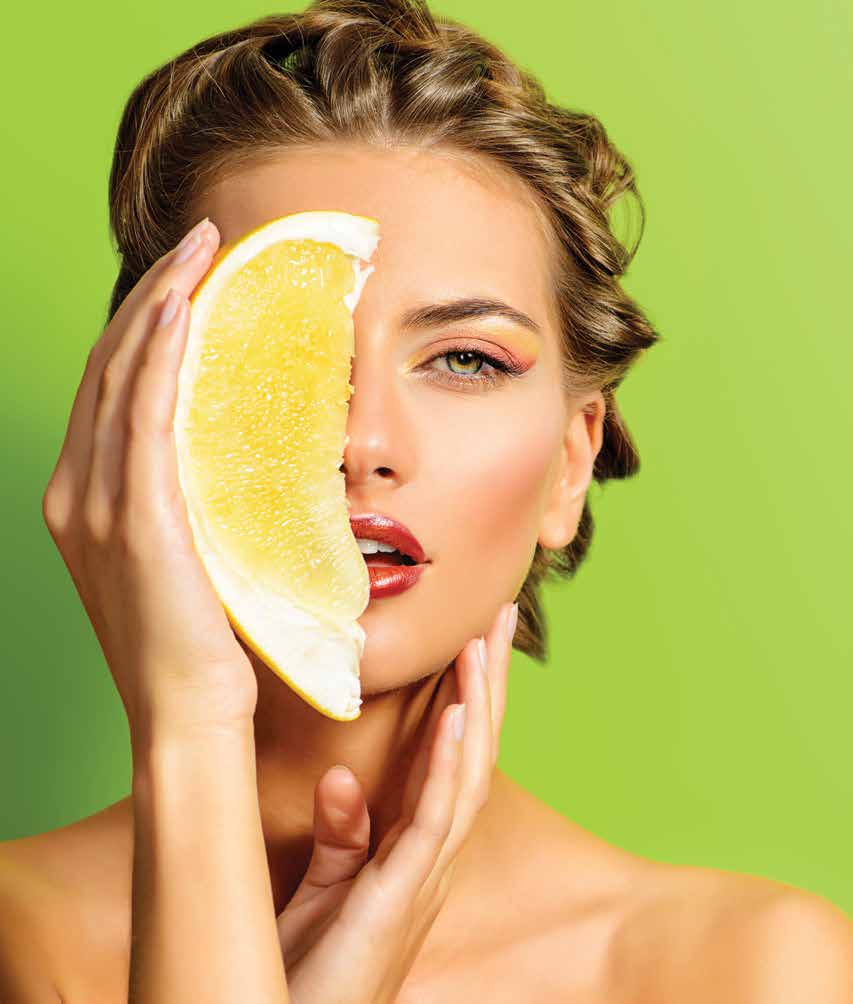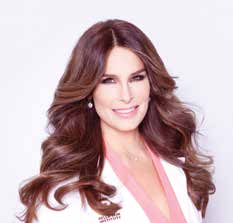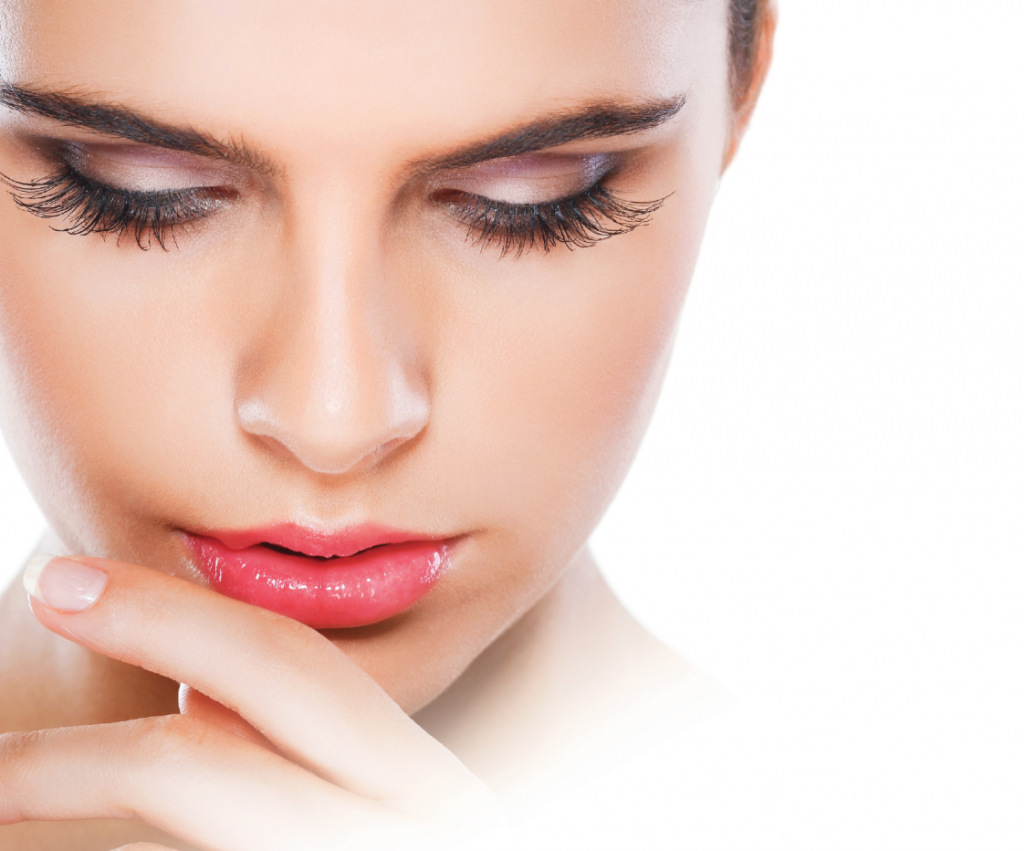 Inside-out beauty is what defines “ingestible beauty.” These are things we eat and drink that contribute a healthy glow to the skin. They provide raw materials that the skin needs to reduplicate collagen, naturally provide moisture (sebum), and protect it from damage. When it comes to food, as we all know, humans are incredibly individual. One person can gorge on a whole tub of peanut butter and look amazing, while another person would end up with skin looking like an oil slick—or worse—have an allergic reaction. In other words, this article does not substitute for individual medical advice, and since nuts, seeds, and fruits are included, it is important to avoid known allergens. That aside, what can we do with our diet to optimize beauty? In my review of inside-out beauty, I will touch on a few supplements, but they are not the focus here (see June 2015: Skin Supplements). We will review some components of the diet that contribute to healthy, glowing skin.
Inside-out beauty is what defines “ingestible beauty.” These are things we eat and drink that contribute a healthy glow to the skin. They provide raw materials that the skin needs to reduplicate collagen, naturally provide moisture (sebum), and protect it from damage. When it comes to food, as we all know, humans are incredibly individual. One person can gorge on a whole tub of peanut butter and look amazing, while another person would end up with skin looking like an oil slick—or worse—have an allergic reaction. In other words, this article does not substitute for individual medical advice, and since nuts, seeds, and fruits are included, it is important to avoid known allergens. That aside, what can we do with our diet to optimize beauty? In my review of inside-out beauty, I will touch on a few supplements, but they are not the focus here (see June 2015: Skin Supplements). We will review some components of the diet that contribute to healthy, glowing skin.
LOW CARB: Following a low-carb diet can preserve the elasticity and youthfulness of skin. Just as in diabetes, intermittent high sugar and carbohydrate levels lead to a phenomenon called glycation. Glycation is the result of sugar molecules binding to protein and fat molecules. Collagen and elastin, the fibers that keep skin firm and elastic, sustain damage from the resulting AGEs (Advanced Glycation End-products). AGEs harden elastin in the arteries of organs and also the elastin in the skin. After age 40, elastin production dramatically declines and the preservation of these precious fibers becomes very important in anti-aging. A lean-protein diet with little or no sugar or processed carbohydrates is ideal. In a high-protein diet, eggs are an excellent addition. They are a good source of biotin and B-vitamin complex and provide building blocks called amino acids that the body uses to repair and replenish keratin protein in the hair, skin, and nails.
PROBIOTICS: Bacteria is all the rage these days. We are not trying to get rid of it but instead working to repopulate the gut with “good bacteria.” Research has shown that bacteria in your gut interacts with your immune system which leads to changes in your skin. Harmful bacteria in the gut can lead to inflammation. Good bacteria keeps harmful bacteria in check. Also, since bacteria is instrumental in the process of digestion and good bacteria allows for better absorption of vital nutrients. Incorporating foods and drinks that are rich in probiotics—such as plain yogurt; soft, aged cheeses; sauerkraut; miso soup; and kombucha—is helpful. Some people prefer to take oral probiotic supplements and swear by the improvements in their skin.
ANTIOXIDANTS: One way to improve the health and clarity of your skin is to ensure that you are receiving the proper amount of antioxidants. Antioxidants are molecules that prevent oxidation of tissues, which has long been considered to be a major cause of aging. There are numerous sources of antioxidants that can be added to your diet. Hot green tea releases a type of antioxidant that has been proven to have anti-inflammatory and anti-cancer properties. Blueberries are especially rich in anthocyanins, a flavonoid with antioxidant capacity. Dark chocolate is rich in flavonoids and polyphenols, both which quench oxidative free radicals. Red wine contains resveratrol, a compound that has been credited via multiple studies with various health benefits due to its powerful antioxidant effect, including longevity. Adding these items to your diet can boost your skin health from the inside out.
FISH: Oily fish, such as sardines and salmon, are rich in omega-3-fatty acids. These fats are known to reduce inflammation, and when secreted on the skin, they may lead to a smoother appearance and reduction in visible inflammation (acne or rosacea). If one is not a fan of these foods, fish oil supplements are available. Biomarine complex is a proprietary blend of fish proteins and biotin that helps stimulate hair and skin-cell growth. Our favorite brand is Viviscal Pro™.
OILS: Besides fish oil supplements, people with dry skin and eczema benefit from taking in oils by the tablespoon to supplement the oils secreted in their sebum (skin oils). My favorite is coconut oil, one to three tablespoons per day, but olive oil is also popular. Monounsaturated fatty acids are not the harmful type, yet do end up supplementing your skin oil production.
NUTS AND SEEDS: Walnuts are the most commonly mentioned nuts that support skin health. In addition, cashews, almonds, pistachios, macadamias, and Brazil nuts are packed with protein, fiber, and unsaturated fats. They are phenomenal snacks that aid in a glowing, smoother complexion. The copper, zinc, and vitamins A, C, and E packed in each little nut promotes healthy collagen production. Pumpkin seeds are considered a skin superfood because they are so high in zinc. Zinc protects cell membranes, helps maintain collagen, and promotes skin renewal. Other seeds that benefit the skin are sunflower, flax, sesame, chia, poppy, and hemp.
SEAFOOD: Lobster and oysters are also very high in zinc content and can be considered skin superfoods—so next time you are at a fine dining restaurant, you can feel slightly redeemed in ordering that pricey lobster dish.
COFFEE: Coffee? Yes! Coffee has bioactive compounds that may help protect your skin from melanoma. According to a study in the Journal of the National Cancer Institute, researchers found that people who drank four or more cups of coffee per day had a 20% lower risk of developing malignant melanoma.
WATER: Water keeps the skin plump and hydrated and keeps the cells of your body happy. Toxins and by-products of digestion are cleared more effectively through the kidneys and liver when the body gets plenty of water. There is some evidence that glycation of tissues is reduced by water intake. So, drink up!
WHAT TO AVOID: Moderation is the key to success. Protein is wonderful, but protein powders with whey can cause breakouts, and soy powder has phyto-estrogens. The feminine and masculine hormones can be avoided by using pea protein powder instead. Coffee is great but excess caffeine dehydrates the skin and causes insomnia, reversing the positive effects. Wine is wonderful but excess alcohol causes dehydration and accelerates aging. Excess salt should be avoided in order to prevent bloating and puffiness. Last but not least, high-sugar foods should be avoided in order to prevent glycation and premature wrinkling of the skin. Beauty is more than just skin deep. Beauty has to do with how we feel, our energy levels, our glow. A healthy, balanced diet is key to having a healthy body and skin to show for it. This article does not cover every possible antioxidant and vitamin-rich food in existence—for example, we completely skipped over kale. The point is that a diet rich in antioxidants, low in refined sugars, and one that supports good bacteria is likely to result in optimal skin.
 By Anna D Guance MD FAAD Board Certified Dermatologist
By Anna D Guance MD FAAD Board Certified Dermatologist
The statements in this article are for general informational purposes only and do not substitute for individual medical advice.


